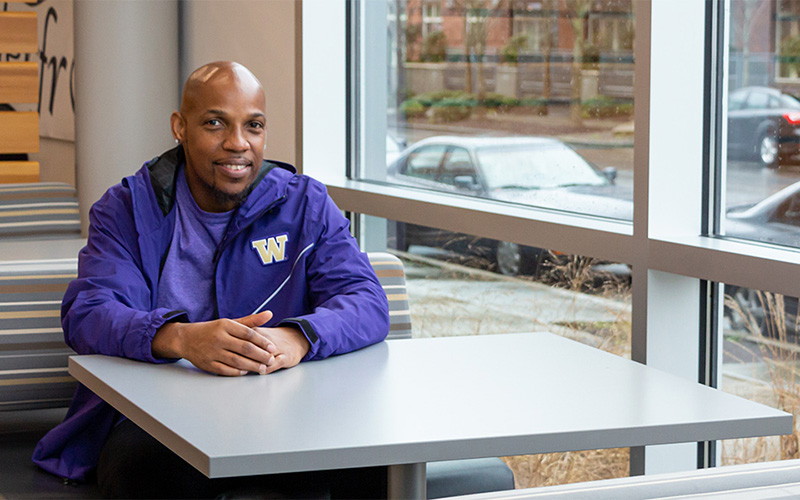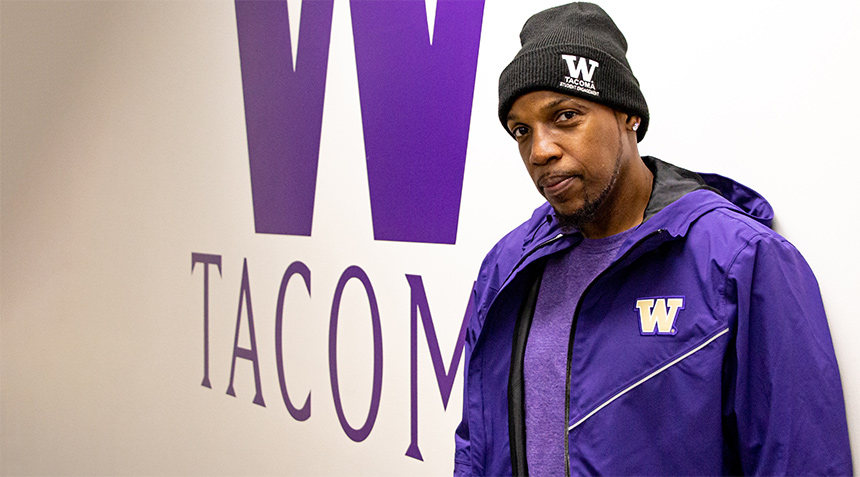
Change Comes for Theron Taylor
After serving a 20-year prison sentence, first-gen psychology transfer student Theron Taylor is finding a new sense of belonging at UW Tacoma.
“There is a message that an education won’t matter if you’re an inmate. But I saw the only way to change was through education.”
Those are the words of Theron Taylor, a hardworking first-generation student in his senior year. Taylor is also 52, a father of three and grandfather of four, and one of the formerly incarcerated students attending classes here at the UW Tacoma campus. This is Taylor’s second year at UW Tacoma, and though he’s still adjusting to life as a student, he’s excited to be here. His road to obtaining his education was not easy.
Taylor grew up in Tacoma, and moved to California in his twenties. A series of events in his life after moving back to his hometown led to incarceration, with Taylor spending over 20 years of his life as an inmate. He sees his experience behind bars as his turning point. “I was sitting in my cell, I had a lot of time for introspection,” Taylor explains. “I wrote poetry, and I had a chance to reflect on my life, and with poetry, I was able to see things around me more clearly — the future, the past, the present. I needed to change my life — how could I change it? I sat there and contemplated. I still had 10 years to go before I was released.”
Those opportunities for change came shortly thereafter when Taylor found a job at the prison in the Department of Corrections education office. “When I saw the educational opportunities, I felt like a hand had touched me and said ‘this is what you’re going to do.’ Because I was in the education department, my eyes were opened.” His experience working with educators and helping inmates navigate the G.E.D. program served as a positive outlet for Taylor and inspired him to pursue an associate of arts degree. “The people in the education department treated me like any other person,” Taylor said. He saw that obtaining an education could be the first step to success in life after release. Through the support of the Sunshine Lady Foundation, a philanthropic organization created by Doris Buffett (sister of Warren Buffett) that funds college degree programs in prisons, Taylor was able to fund his associate’s degree from Walla Walla Community College and graduate while serving his sentence.
When a formerly-incarcerated person came to a graduation ceremony at the prison to give a keynote speech, it sparked a desire in Taylor to pursue a bachelor’s degree. One of his counselors suggested he contact Ari Kohn, a University of Washington alumnus and founder of the Post-Prison Education Program (PPEP), and apply to be considered as a candidate for the program upon his release. According to PPEP’s website, theirs “is the only program in Washington State that offers wrap-around services to releasing prisoners and their families in conjunction with providing them access, support, and the resources to attain post-secondary education.” PPEP offers tools and support to program participants and works not only to help them with their education, but also to find meaningful employment, break free from cycles of poverty and recidivism, and become leaders in their communities.
Taylor applied and was accepted into PPEP. Upon his release in 2018, he started classes at Central Washington University’s satellite campus at Pierce College. After getting to know Taylor personally and seeing his drive and potential, Kohn prompted Taylor to consider becoming a Husky. “Ari being who he is — an alum of UW — he wanted me to graduate from UW,” explains Taylor. “I thought that sounded impossible! I would have never thought about it coming from where I came from. But he got me this far, why not believe and trust in him?”
Taylor filled out the application paperwork and met with UW Tacoma Assistant Professor Chris Beasley, who provided support to him in writing his personal essay, reminding him of how far he had already come as well as his potential for the future. When Taylor was accepted into UW Tacoma, everything seemed to fall into place. “I knew it was what I was supposed to be doing, and when I got here it was so overwhelming and powerful,” said Taylor.

Taylor found a sense of belonging at UW Tacoma. Though adjusting to his first quarter was somewhat challenging, Taylor found his stride and struck a healthy balance between school, volunteering at the Tacoma Rescue Mission, and spending time with friends and family. “I felt home,” he said. “I felt like this is the place I’m supposed to be, and that’s what kept me going.”
With the support of Professor Beasley, Taylor also started the Formerly Incarcerated Student Association (FISA) on campus. FISA is a support group that meets weekly, and is designed to create support and a sense of community for formerly incarcerated students seeking degrees, while also making a positive impact on campus and in the community.
Taylor’s plans for the future extend beyond his own accomplishments. He believes his own experience with prison led to his calling — supporting the success of other incarcerated individuals seeking an education, and helping to break the cycle of recidivism. “Being 52, knowing it was never too late, that I didn’t run out of time — my life didn’t end in there,” said Taylor. “It’s not about me anymore.” He decided upon a degree in psychology, knowing he wanted to help others who have faced similar circumstances and challenges in life.
One of Taylor’s proudest moments in life since his release came last summer. “In June I went back and spoke at the institution I was at, as a graduation keynote speaker,” he said. “The topic of my speech was ‘I am you, and you are me.’ I had just left here — I was sitting in those seats, and now I’m standing up here. You’re sitting in those seats now too, so you’re on your way.”



